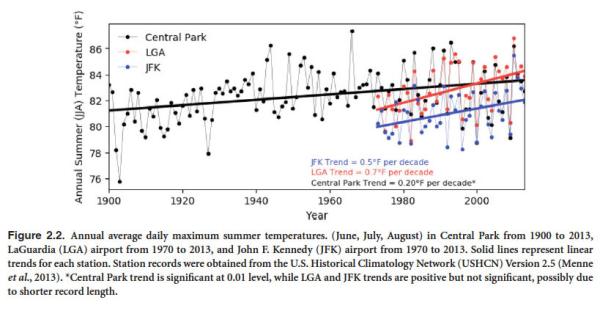
New Yorkers can brace for rising temperatures, increasing precipitation and rapidly rising sea levels in the years to come. That’s the finding by City College of New York experts in a study presented to the Mayor’s Office of Recovery & Resiliency for planning and investment purposes. CCNY’s contribution to the New York City Panel on Climate Change (NPCC) 2019 report is based on nearly four years of research.
Jorge E. Gonzalez, NOAA CREST Professor of Mechanical Engineering; Naresh Devineni, associate professor, civil engineering; and James Booth, assistant professor, Earth & Atmospheric Science, were the lead authors of the report’s second chapter that focused primarily on climate science.
Their key findings include:
- NYC will experience more frequent and intense heatwaves with time;
- The city is not only getting warmer, it’s also getting more humid;
- NYC appears to be getting more intense rainfall events in short periods – particularly in summer;
- The number of “extreme days” or cold snaps in the city are decreasing at dramatic rates.
Further, they found that annual temperature and precipitation increases were reaffirming previous projections from the second NPCC report for the 2020s.
“We confirmed that it’s happening so it means that it’s getting warmer,” said Gonzalez, who’s been a member of the panel since 2015.
City College students mentored by Gonzalez and Devineni also participated in the study. They included Lea Rivera, Arun Ravindranath and Luis Ortiz, a recent PhD graduate.
Gonzalez, Devineni, Rivera, Ravindranath and Ortiz are from CCNY’s Grove School of Engineering that is celebrating its centennial. Booth is from the Division of Science.
About the New York Panel on Climate Change
Understanding climate change in cities is important because of the dramatic growth in urban populations and thus vulnerability, as well as the emerging role of cities as first responders to climate change. Since 2008, the New York Panel on Climate Change (NPCC) has analyzed climate trends, developed projections, explored key impacts, and advised on response strategies. Charting a future course for the NPCC ensures that NYC continues to play its role as a climate change leader for other cities, not only in the United States but around the world.
About The City College of New York
Since 1847, The City College of New York has provided a high quality and affordable education to generations of New Yorkers in a wide variety of disciplines. CCNY embraces its role at the forefront of social change. It is ranked #1 by the Harvard-based Opportunity Insights out of 369 selective public colleges in the United States on the overall mobility index. This measure reflects both access and outcomes, representing the likelihood that a student at CCNY can move up two or more income quintiles. In addition, the Center for World University Rankings places CCNY in the top 1.2% of universities worldwide in terms of academic excellence. More than 16,000 students pursue undergraduate and graduate degrees in eight professional schools and divisions, driven by significant funded research, creativity and scholarship. CCNY is as diverse, dynamic and visionary as New York City itself. View CCNY Media Kit.